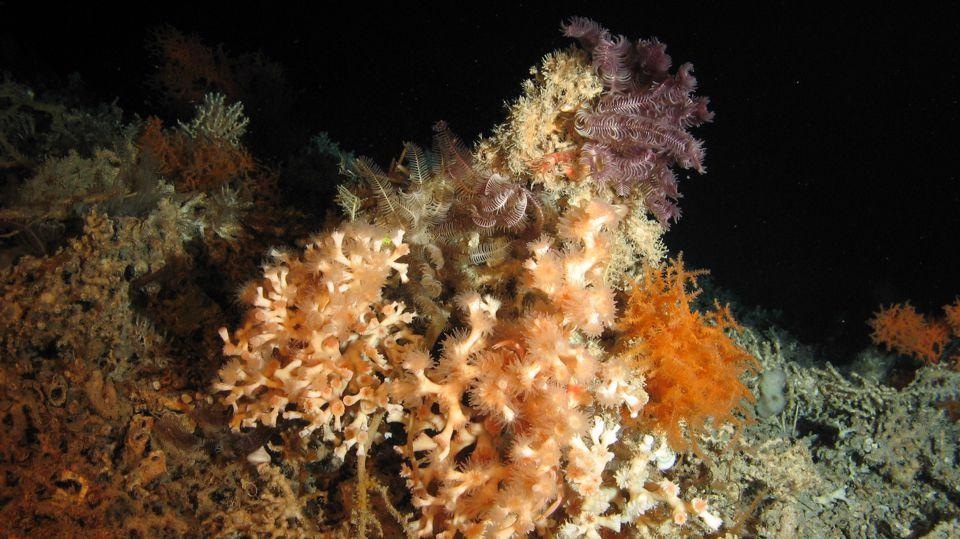Corals, including tropical and cold-water species, react to changes in their surroundings, including alterations in salinity, temperature, and pH values.
 Large colony of the cold-water coral Lophelia pertusa colonized by crinoids and soft corals in 700 m of water (Porcupine Seabight, Irish continental margin). Image Credit: MARUM—Center for Marine Environmental Sciences, University of Bremen
Large colony of the cold-water coral Lophelia pertusa colonized by crinoids and soft corals in 700 m of water (Porcupine Seabight, Irish continental margin). Image Credit: MARUM—Center for Marine Environmental Sciences, University of Bremen
MARUM scientists, in a study headed by Dr Rodrigo da Costa Portilho-Ramos, have currently analyzed how warmer temperatures happening due to climate change are causing an impact on the cold-water corals.
The researchers analyzed elaborately how such corals have reacted to environmental changes over the past 20,000 years. Their study has been reported in the professional journal PLOS Biology.
Cold water corals, and the species Lophelia pertusa especially, are known as the architects of complicated reef structures. They construct the basics of essential habitats for deep-sea organisms that determine safety as well as food within the structures. But coral reefs react very sensitively to conditions that are getting changed.
These include warming of the ocean waters, acidification, falling oxygen content, and the variable supply of food. An alteration in any one of those parameters, as an impact of global climate change, for instance, could affect the health of the entire coral reef.
According to a new study, it is significant to comprehend precisely how these ecosystems tend to react to environmental alterations to safeguard them in a more effective manner in the future.
The first author of the study Rodrigo da Costa Portilho-Ramos of MARUM—Center for Marine Environmental Sciences of the University of Bremen, with his collaborators, have investigated sediments from six cold water coral locations in the Mediterranean and the North Atlantic to determine the critical parameters that could activate the fatality and ensuing proliferation of cold-water corals.
Information offering better knowledge into the environmental conditions of the past is stored in such sediments. This fact enables scientists to identify if, when and why cold-water corals flourished. The authors stress that the outcomes could also be utilized to display how corals may respond to climatic changes in the future.
The study examines the variations of the most significant environmental factors over the past 20,000 years. This is the period of general global warming as the last glaciation and compares them with the happening of the cold-water corals.
We looked back into the past to understand how Lophelia pertusa reacted to environmental changes.
Dr Rodrigo da Costa Portilho-Ramos, Research Faculty, University of Bremen
The corals faded from or returned to a region primarily when the food supply or the oxygen content of the water got altered. Cold water corals feed on microscopically small plankton and other particles that are transported through ocean currents. The salinity and temperature of the water had little impact on the fatality or proliferation of cold-water corals.
We therefore assume that food supply and availability of oxygen are the primary factors that determine the life or death of cold water corals.
Dr Rodrigo da Costa Portilho-Ramos, Research Faculty, University of Bremen
It is not evident what type of effect ocean acidification has over a long period because there is no paleoceanographic indicator for this parameter.
Acting as ecosystem “engineers”, cold-water corals add up considerably to the development of biodiversity hotspots in the deep sea.
With their impact on nutrient cycles and food webs, their role as fish nurseries, and their splendid biodiversity, cold-water coral reefs offer significant ecosystem services.
To continue such services in the future under the impact of climate change, the outcomes of this study develop a significant foundation for shaping knowledge-based management strategies for such deep-sea ecosystems. Also, they contribute considerably to the aim of the Bremen Cluster of Excellence. This has been dedicated to the study of the ocean floor.
Journal Reference:
Portilho-Ramos, R. C., et al. (2022) Major environmental drivers determining life and death of cold-water corals through time. PLOS Biology. doi.org/10.1371/journal.pbio.3001628